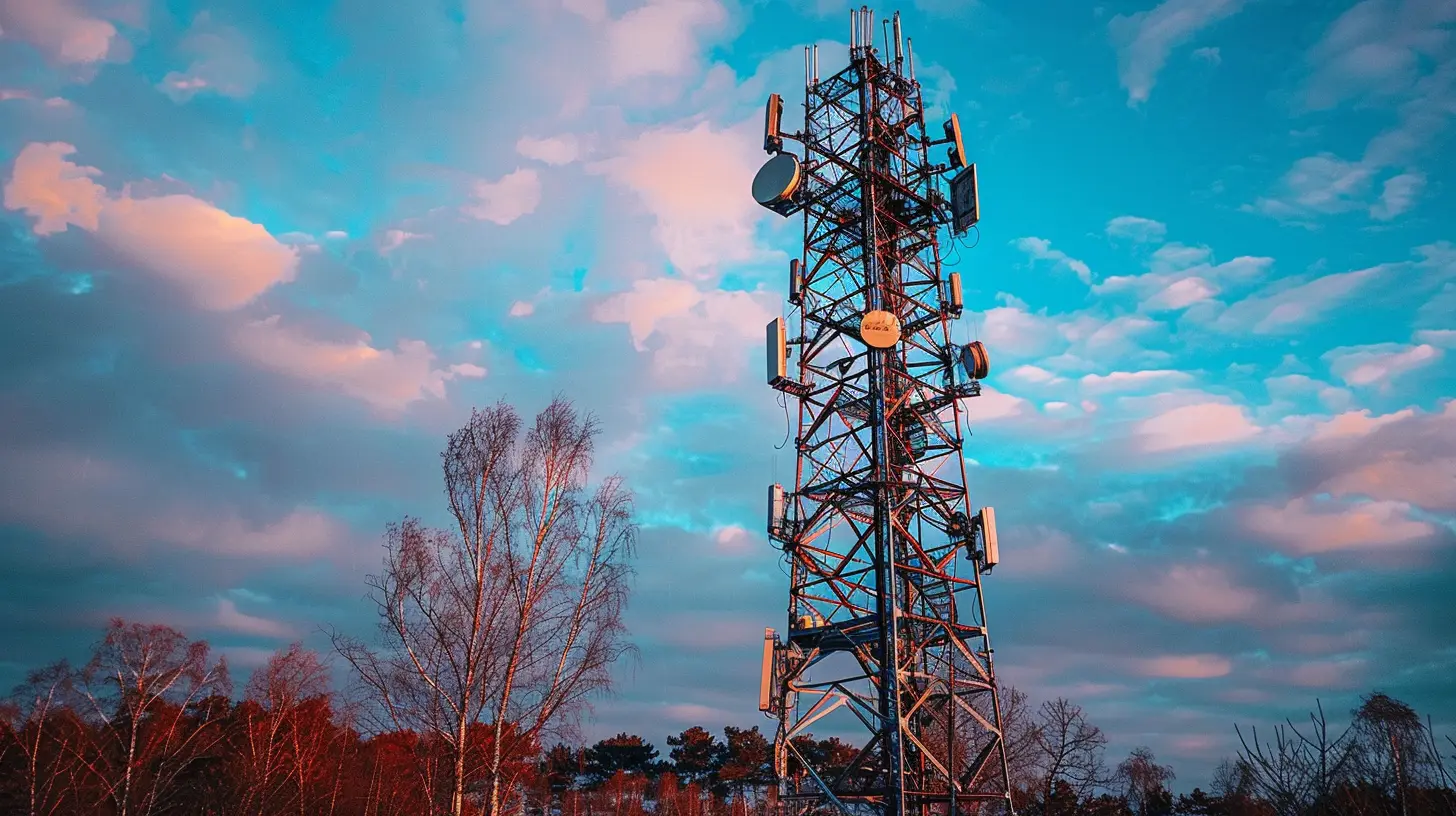The Role of 5G in Fighting Climate Change
15 September 2025
Climate change is no longer a far-off threat—it’s here, it's real, and it's reshaping how we live. From rising sea levels to extreme weather, we've all seen the signs. But here's a twist: while the tech world often gets a bad rap for contributing to carbon emissions, a powerful game-changer is emerging from its core—5G.
Yes, that same 5G network that powers your ultra-fast phone connection could actually help save the planet. Sounds wild, right? But bear with me. Let’s dive into how 5G technology is playing a surprisingly pivotal role in the global battle against climate change.
What Exactly Is 5G, and Why Should You Care?
Before we get into the climate-saving stuff, let's break down what 5G is. In simple terms, it's the fifth generation of mobile networks. Compared to 4G, it’s exponentially faster, more reliable, and designed to handle way more devices at once. Think of it like going from a congested two-lane road to a 12-lane highway built for sports cars.But 5G isn't just about streaming Netflix in 4K on your commute. It’s a foundational technology with the potential to transform everything from how cities function to how industries operate—all while being more energy-efficient.
1. Smarter Energy Grids: Making Every Watt Count
Ever left the lights on and felt guilty about it? Multiply that by millions—even billions—of people, and you’ll see how wasteful our current energy use is. Enter smart grids powered by 5G.With 5G’s ultra-low latency, energy providers can monitor usage in real time, adjust supply instantly, and even predict demand before it happens. That means utilities can route power where it’s needed and cut it where it’s not—like a traffic cop for electricity.
Key benefits:
- Reduced energy waste- Better integration of renewable energy sources
- Enhanced grid reliability and outage management
This isn’t just good for your electricity bill; it’s a big win for the planet.
2. Revolutionizing Transportation with Smart Mobility
Let’s face it—cars, trucks, and planes are massive greenhouse gas emitters. But imagine this: what if our vehicles talked to each other and the road around them? Thanks to 5G, that’s becoming a reality.Here's how 5G helps:
- Vehicle-to-Everything (V2X) communication enables cars to "chat" with traffic signals, pedestrians, and even the road.- Self-driving cars can operate more efficiently, reducing fuel consumption and traffic jams.
- Public transport systems can be optimized in real time, improving routes and cutting down idle time.
All of this translates to fewer emissions, less traffic congestion, and cleaner air. So next time you're stuck in gridlock, think of 5G as the invisible force that might one day set you free.
3. Building Smart Cities for a Sustainable Future
Now, let’s zoom out and look at the big picture—our cities.Urban areas account for more than 70% of global CO₂ emissions. Yikes. But with 5G, cities can get a serious eco-upgrade. From smart lighting that only turns on when needed to sensors that monitor pollution levels in real time, 5G turns cities into responsive, efficient ecosystems.
A few cool examples:
- Smart waste management systems that optimize garbage collection routes- Water leak detection systems that prevent massive waste
- Real-time air quality monitoring to guide environmental policies
Think of a smart city like a living, breathing organism that adapts on the fly—and never forgets to turn off the lights.
4. Empowering Precision Agriculture: Greener Farms, Better Yields
Agriculture is a double-edged sword—it feeds us, but it’s also a major source of greenhouse gases. You’ve probably heard that cows emit methane (a potent greenhouse gas), but the real issue is inefficiency.5G-enabled precision agriculture flips the script by using sensors, drones, and real-time analytics to optimize everything.
What gets better on the farm?
- Water usage (only where and when it’s needed)- Fertilizer application (targeted instead of blanket)
- Crop monitoring (detect diseases early, reduce chemical use)
This means higher yields with a lower environmental footprint. Basically, it’s farming smarter—not harder.
5. Remote Work and Virtual Collaboration: Cutting Down on Commuting
The pandemic taught us that a lot of work can be done from anywhere. But to really make remote work seamless, we need stable, high-speed internet—and 5G delivers just that.When people can work from home without lag or dropped calls, here’s what happens:
- Fewer cars on the road
- Reduced need for office space (and the energy to power them)
- Lower overall carbon emissions
It may not seem like much individually, but when millions skip their daily commute, the environmental impact is massive. Plus, who doesn't love working in their pajamas?
6. Reducing Industrial Emissions Through Automation
Factories are traditionally heavy polluters. But 5G allows for advanced automation, meaning machines can work together more efficiently without human intervention. Sensors and robotics powered by 5G can monitor systems 24/7, anticipate issues, and fine-tune operations for maximum efficiency.The industrial benefits:
- Predictive maintenance (less downtime, less waste)- Real-time energy monitoring
- Automation of repetitive, energy-hungry tasks
Think of a 5G-powered factory as a well-tuned orchestra, where every machine knows its role and plays in harmony—without wasting a single note (or kilowatt).
7. Real-Time Environmental Monitoring and Disaster Response
Climate change also means more frequent and intense natural disasters. 5G isn’t going to stop hurricanes, but it can help us respond faster and smarter.With 5G-enabled sensors and drones, emergency responders can:
- Monitor flood levels in real time
- Detect wildfires early using thermal imaging
- Coordinate faster via augmented reality and live data feeds
Quick response means fewer lives lost, less damage, and more resilient communities. 5G helps us stay one step ahead.
8. Supporting the Circular Economy and Smart Manufacturing
The idea behind a circular economy is simple: reduce, reuse, recycle. But the execution? Tricky.Here’s where 5G steps in—by enabling better tracking of products through their entire lifecycle. Imagine a world where every product has a digital twin that tracks its use, wear, and recyclability. Manufacturers can then design with reuse in mind, all thanks to the ultra-fast, data-rich environment 5G provides.
It's like giving every product a journal that tells its story—how it was made, where it’s been, and where it can go next.
But Wait… Isn’t 5G Power-Hungry?
Great question! It’s true that rolling out 5G infrastructure requires energy. But here’s the kicker: 5G is actually more energy-efficient per bit of data transmitted compared to 4G.As network equipment matures and energy-saving protocols improve, the long-term emissions from 5G will be significantly lower. Plus, the energy saved by using 5G across other sectors more than offsets its own carbon footprint.
In short, the juice is worth the squeeze.
The Road Ahead: Challenges and Opportunities
Let’s be real—5G isn’t a silver bullet. There are hurdles to overcome:- Infrastructure costs
- Global inequalities in access
- Cybersecurity concerns
But with the right investments and policies, the benefits far outweigh the drawbacks. The fusion of 5G with AI, IoT, and renewable energy could be the tech trifecta we need to tip the climate scales.
Final Thoughts: Can 5G Save the Planet?
No, 5G alone won’t solve climate change. But it’s a crucial piece of the puzzle. Think of it as the nervous system of a smarter, greener, more responsive world. It enables other technologies to shine, boosts efficiency, and opens doors we didn’t even know existed.So next time someone says “It’s just faster internet,” you’ll know better. It’s faster, yes—but it’s also smarter, cleaner, and part of a brighter, greener future.
all images in this post were generated using AI tools
Category:
5g TechnologyAuthor:

Reese McQuillan
Discussion
rate this article
1 comments
Kane Horne
5G technology offers immense potential to enhance efficiency, enable smart solutions, and reduce emissions. Its role in combating climate change underscores the importance of innovation for sustainability.
September 15, 2025 at 11:34 AM

Reese McQuillan
Thank you for your insightful comment! Indeed, 5G technology holds great promise for driving sustainable innovations and improving efficiency in our efforts to combat climate change.


